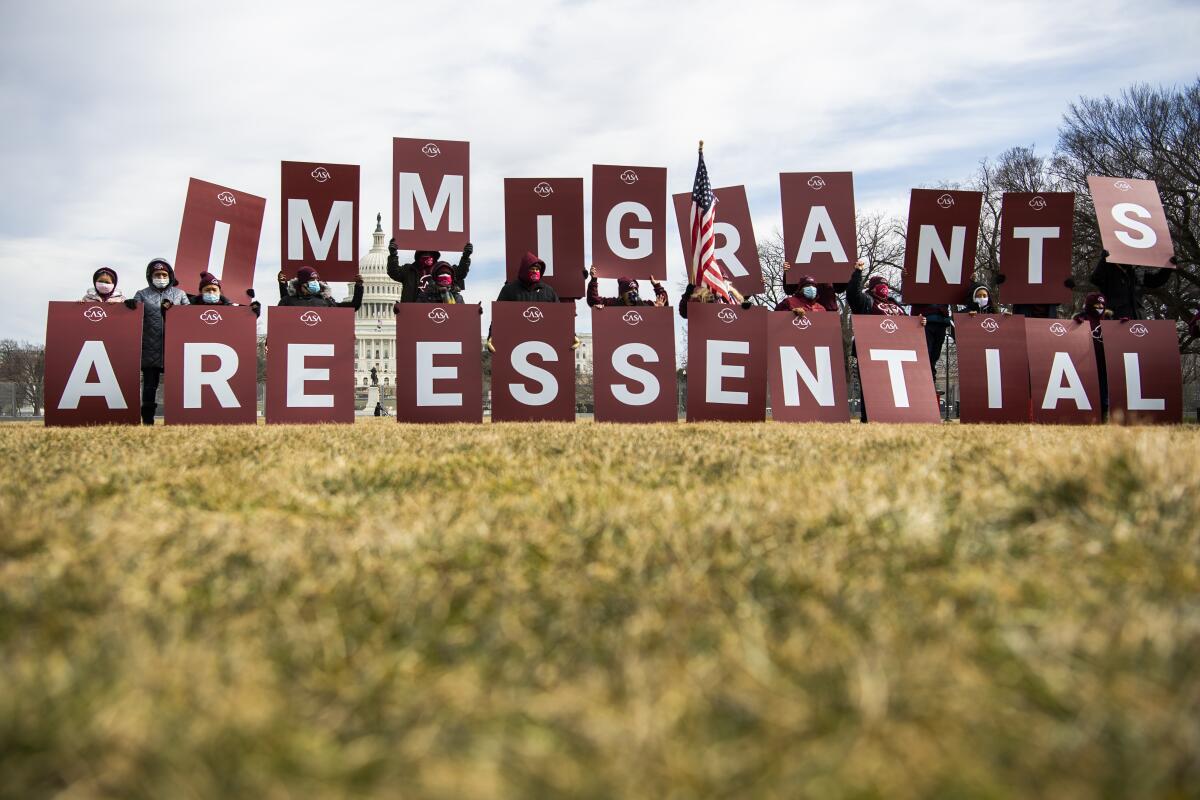Op-Ed: Stop deporting essential workers who keep America running

Americans have a moral and economic imperative to pass the Citizenship for Essential Workers Act, which would provide a pathway to citizenship for the roughly 5 million people living here illegally who risked their lives on the COVID-19 front lines to keep the United States functioning.
About 74% of undocumented people in the U.S. are essential workers. Thousands of them, in healthcare, agriculture, food services, construction, child care and more died keeping the economy and Americans alive while working for subpar wages, often without adequate protective equipment.
“They have absolutely earned the right to live without fear,” Sen. Alex Padilla, who introduced the bill, told me. California’s first Latino senator, Padilla is a leading advocate for the bill’s inclusion in a reconciliation package on jobs and infrastructure, which may be the best chance to protect this critically important group.
If the Senate parliamentarian greenlighted its inclusion in reconciliation, the bill would only need the votes of 50 senators to pass. While some Republicans claim they’d consider partial legalization in exchange for beefed-up border militarization, the past suggests otherwise. In 2013, a historic bipartisan immigration reform measure, known as the “Gang of Eight” bill, would have poured an unprecedented $43.6 billion into border enforcement. It died in the Republican-controlled House, smeared as “amnesty” for “criminals.”
Since then, the Republican Party — hijacked by its nativist fringe — has reliably chosen xenophobia over American workers’ well-being.
Citizenship for essential workers would inject $989 billion into the economy, create hundreds of thousands of jobs and boost American workers’ wages, according to a recent study by the Center for American Progress and economists at UC Davis. The study looked at the impact of four different legalization scenarios. Giovanni Peri, co-author of the study, says creating a path to citizenship for all undocumented people — as proposed in President Biden’s U.S. Citizenship Act of 2021 — would have the biggest impact, boosting gross domestic product by $1.7 trillion. “This reform could fully fund the infrastructure bill,” he told me.
But Biden’s ambitious immigration reform bill has lost some traction. The focus has shifted to narrower measures focused on specific groups, such as “Dreamers” and people with temporary protected status (through the American Dream and Promise Act) or farmworkers (through the Farm Workforce Modernization Act). Those bills passed the House with bipartisan support but are unlikely to meet the 60-vote filibuster threshold in the Senate.
While it’s crucial to consider folding those bills into the infrastructure package, the Citizenship for Essential Workers Act must not be forgotten. Given the central role of essential workers in critical infrastructure, it would be the most logical bill to include in Biden’s package. It would protect not only these workers, but also their children, spouses and parents, and the closest relatives of people who died from COVID-19. It would encompass farmworkers and countless Dreamers, whose parents are frequently essential workers. It could cover as many as 7 million people, according to one of Padilla’s aides.
Rep. Joaquin Castro (D-Texas), who co-wrote the bill with Padilla, Sen. Elizabeth Warren (D-Mass.) and Rep. Ted Lieu (D-Torrance), says legalizing essential workers is key for our economic recovery and for the well-being of the broader Latin American community. Latinos are eight times more likely than white Americans to live in a household with an essential worker and were disproportionately killed by COVID-19 — and at younger ages.
“This would be doing right by the Latino community and be an affirmation of their extraordinary contribution at a scary moment in American history,” Castro said of the bill, noting that white hate fueled by Trump-era “demagoguing” is another factor that has put Latino lives in danger. This measure, he said, “would unleash the economic power of so many individuals.”
Last spring, then-President Trump recognized essential workers’ crucial role. He issued guidance stating that they “have a special responsibility” to maintain their “normal work schedule.”
But now that the discussion has shifted toward allowing them to come out of the shadows and earn decent wages, Trump and other Republicans are back to hawking the fantasy that immigrants are welfare-guzzling, job-stealing murderers and that giving them legal status would destroy the country. Trump plans to visit the southern border later this month to help this campaign of stoking white racial anxiety.
The most common argument against any legalization is that it invites more immigration, blaming a border “crisis” on humane policies. But the largest collective exodus of Central Americans occurred as Trump threatened immigrants with the military and proposed shooting their legs.
The great majority of newcomers are fleeing violence and poverty in Guatemala, Honduras and El Salvador. The idea that asylum seekers are risking their lives to come because of what happens on Capitol Hill is stunningly myopic on the part of lawmakers and ignores decades of evidence showing that deterrence strategies aren’t effective when people are fleeing for safety — unless, of course, you consider a surge in deaths at the border an indicator of effectiveness.
Restrictionists also argue that immigration can hurt some unskilled workers’ wages in the short term. But research suggesting that effect, including by the economist George Borjas, has been repeatedly disputed. Meanwhile, the anti-immigration camp ignores what most economists accept: immigration provides net long-term gains to the economy.
But this debate about essential workers isn’t about newcomers at the border, as much as Republicans want to keep the focus there. It’s about workers in the U.S. who have been here, on average, for 18 years, and who saved our economy last year. They have kids, homes and jobs here.
As Padilla said during a Senate Judiciary Committee hearing on his bill last month, “Let’s take a moment to reflect on the fact that the United States government deems these immigrants essential for keeping our country running and keeping Americans alive.”
Jean Guerrero is an investigative journalist and author of “Hatemonger: Stephen Miller, Donald Trump and the White Nationalist Agenda.” She is a contributing writer to Opinion.
More to Read
A cure for the common opinion
Get thought-provoking perspectives with our weekly newsletter.
You may occasionally receive promotional content from the Los Angeles Times.







